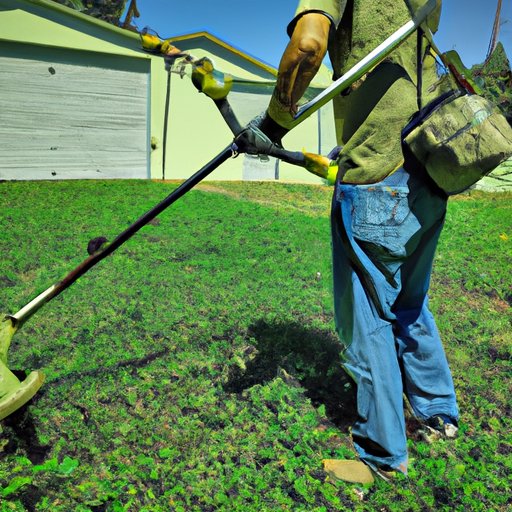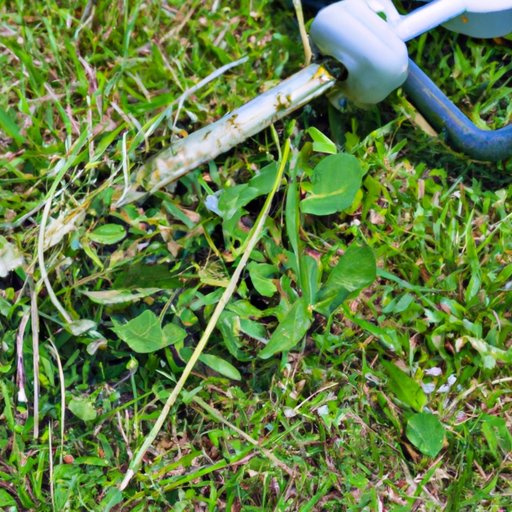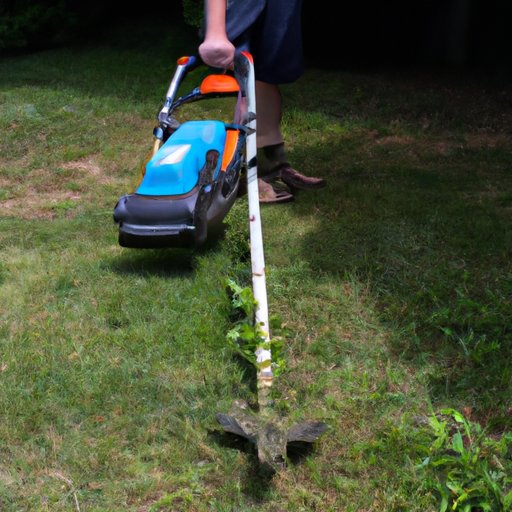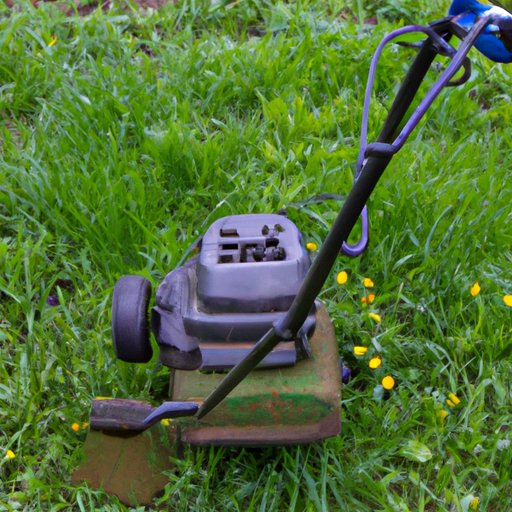Introduction
Weed eaters, also known as string trimmers, are essential tools for lawn care and maintenance. They are used to trim grass and weeds along walls, fences, and other hard-to-reach areas that would otherwise be difficult to mow. If you’re new to using a weed eater, it can seem intimidating at first. However, with a few simple steps, you’ll be able to start your weed eater quickly and easily.

Definition of a Weed Eater
A weed eater is a gardening tool that uses a flexible monofilament line attached to a rotating spool to cut grass and weeds. It is powered by either a gasoline or electric motor and is used to trim areas close to walls, fences, and other obstructions. Weed eaters are typically lighter and more maneuverable than traditional lawnmowers, making them ideal for smaller yards or hard-to-reach places.
Benefits of Using a Weed Eater
Using a weed eater can help keep your lawn looking neat and tidy. It can also save you time and effort since you don’t have to manually trim around obstacles. Additionally, weed eaters are much quieter than lawnmowers, making them ideal for residential neighborhoods. Finally, they can help prevent weed growth by cutting down long grass and weeds before they have a chance to spread.
Step-by-Step Guide to Starting a Weed Eater
Now that you know what a weed eater is and its benefits, let’s look at how to start one. Here’s a step-by-step guide to get you started:
Preparing the Area
Before you begin, make sure the area you’ll be weed eating is clear of any debris, such as rocks, sticks, and other objects that could damage the weed eater’s line. You should also check for any low-hanging branches or electrical wires that could be in the way.
Preparing the Weed Eater
Once the area is clear, you can begin preparing the weed eater itself. Start by checking the fuel tank to make sure there’s enough gas for the job. Next, inspect the line to make sure it’s not worn or frayed. Then, attach the shoulder strap if your weed eater has one.
Starting the Weed Eater
Most weed eaters have a similar starting procedure. First, make sure the power switch is in the “off” position. Then, press the primer bulb several times until it’s full. Finally, move the power switch to the “on” position and pull the starter cord until the engine starts. Once the engine is running, you can adjust the throttle as needed.
How to Operate a Weed Eater for Beginners
Now that you know how to start a weed eater, let’s look at how to use it. Here are some tips for beginners:
Understanding the Controls
Most weed eaters have two main controls: the power switch and the throttle. The power switch is used to turn the weed eater on and off, while the throttle is used to control the speed of the line. Depending on the model, the throttle may be located on the handle or on the body of the weed eater.
Different Techniques for Weed Eating
When using a weed eater, it’s important to use the right technique to avoid damaging the line or the surrounding area. To do this, hold the weed eater at a 45-degree angle and keep the line parallel to the ground. Move the weed eater in a sweeping motion, taking care to avoid hitting any obstacles or people.
Tips on Getting the Most Out of Your Weed Eater
To get the most out of your weed eater, it’s important to take proper care of it. Here are some tips:
Proper Maintenance
Regularly inspect your weed eater for signs of wear and tear. Make sure the line is in good condition, and replace it when necessary. Also, check the fuel filter and air filter and clean or replace them as needed.
Knowing When to Replace Parts
It’s important to replace parts when they become worn or damaged. This includes the line, spark plug, and carburetor. Replacing these parts can help ensure your weed eater runs smoothly and efficiently.

A Quick Start Guide to Weed Eating
If you’re just getting started with weed eating, here are some tips to help you get the job done quickly and safely:
Choosing the Right Weed Eater for Your Needs
When choosing a weed eater, make sure to consider the size of your lawn and the type of vegetation you’ll be cutting. Electric weed eaters are best for small yards, while gas-powered models are better suited for larger areas. Also, make sure to choose a model that’s comfortable and easy to use.
Knowing What Weeds to Target
When weed eating, focus on removing tall grasses and weeds that can’t be reached with a lawn mower. Also, be aware of any plants that shouldn’t be trimmed, such as shrubs and flowers. By focusing on the right weeds, you’ll be able to keep your lawn looking neat and tidy.

How to Safely Use a Weed Eater
When using a weed eater, safety should always be your top priority. Here are some tips to help you stay safe:
Wearing Protective Clothing
When operating a weed eater, it’s important to wear proper clothing and protective gear. This includes long pants, closed-toe shoes, gloves, goggles, and ear protection. Additionally, make sure to keep loose clothing away from the blades.
Keeping Children and Pets Away
Keep children and pets away from the area while operating a weed eater. The spinning blades can cause serious injury if they come into contact with skin or clothing. Additionally, the noise from the weed eater can be loud and distracting.
Following Safety Precautions
Always read the manufacturer’s instructions before operating a weed eater. Additionally, never operate the weed eater without wearing the proper protective gear. Finally, make sure to keep the weed eater in a safe place when not in use.
Conclusion
With a few simple steps, you can start and operate a weed eater safely and effectively. Start by preparing the area and the weed eater itself. Then, follow the steps to start the weed eater. Finally, understand the controls and different techniques for weed eating. Remember to take proper care of your weed eater and always follow safety precautions.
By following this guide, you’ll be able to get the job done quickly and efficiently. With practice, you’ll soon be a pro at weed eating.
(Note: Is this article not meeting your expectations? Do you have knowledge or insights to share? Unlock new opportunities and expand your reach by joining our authors team. Click Registration to join us and share your expertise with our readers.)
